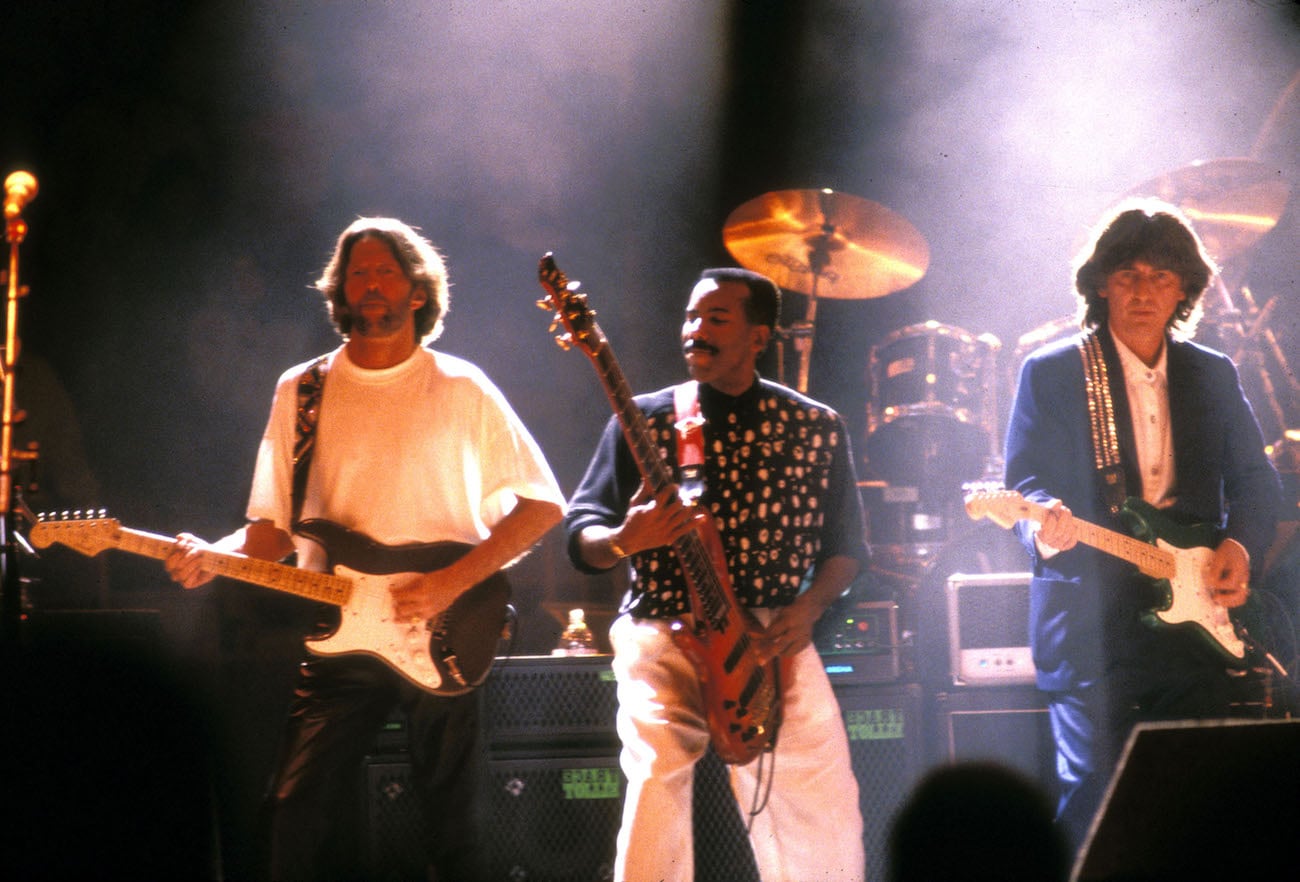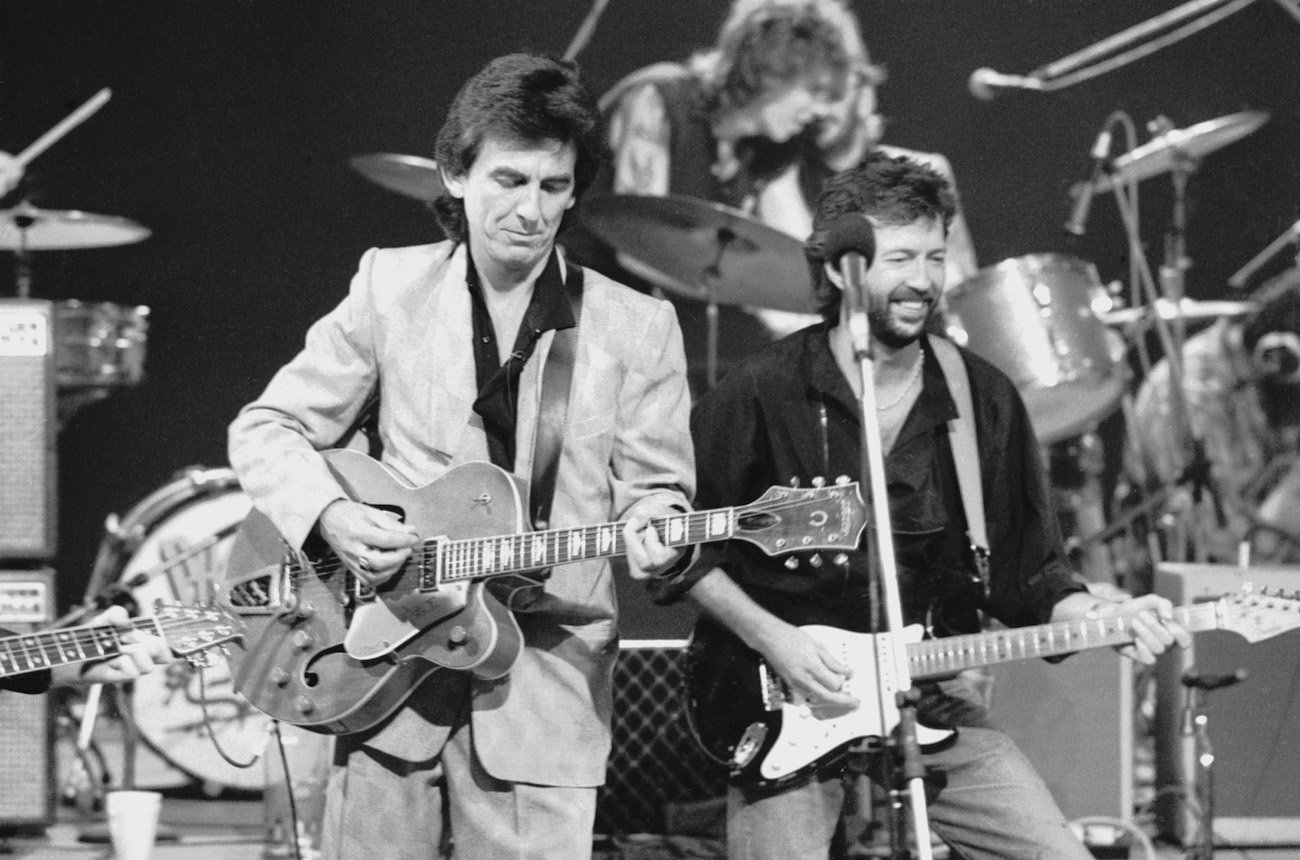
How Eric Clapton Convinced George Harrison to Come on Tour With Him in 1991
Eric Clapton had to be very persuasive when asking his long-time friend and collaborator, George Harrison, to join him on his 1991 Japanese tour.
George was not the biggest fan of touring. As a Beatle, he was dragged around the world multiple times through the height of Beatlemania. Touring destroyed George’s nerves. He often felt mentally and physically unsafe, paranoid, and nervous. Thankfully, the band stopped touring in 1966.
Bravely, though, George embarked on his first and only solo American tour in 1974. That was no better. So, George didn’t have a good track record for performing. Clapton’s argument had to be strong.

Touring was not the former Beatle’s specialty
George enjoyed performing in The Beatles’ early days, especially during the band’s residency in Hamburg, Germany. Then, Beatlemania started a couple of years later.
“If you had 2 million people screaming at you, I think it would take a long time to stop hearing that in your head,” George’s wife, Olivia, told Rolling Stone. “George was not suited to it.”
They hid from hoards of screaming girls in cars and hotel rooms, and police escorted them to the stage in armored vehicles. Performing had become impersonal.
In Here Comes The Sun: The Spiritual And Musical Journey Of George Harrison, Joshua M. Greene wrote, “During a concert in Kansas City in September 1964, hundreds of screaming fans broke through police barriers and attacked the band’s mobile dressing room.
“The van rocked backward and for-ward until at last it pitched over with a groan. To restore order, police retaliated by attacking the mob with rubber billy clubs… The Beatles had managed to survive the circumstances of their career thanks to a limitless supply of friendship and an ability to laugh at anything, even tragedy—but the humor had gone out of their lives.”
Touring with The Beatles was simple, at least. They had little gear to set up and played short sets. George’s 1974 American tour was not similar. It was a disaster at every point. Performances came few and far between.
In 1987, after George released Cloud Nine, Creem Magazine asked if he’d tour. “Oh, I hope not (laughs),” George replied. “No, I wouldn’t mind doing a few shows here and there, but people keep asking me this, and the only way I can see it is to even to do one concert is so much work: to get a band, rehearse them, not just the band, the lighting and the sound … these days, you can’t just go out like the Beatles did, where we had a little amp each and a microphone.
“You have to get such an entourage together and work so much that it’s hardly worth doing all that to just do one or two shows. And then it means you’re gonna tour for six months, and I don’t know if I can last six months on the road.”
George said he’d rather perform at a remote Holiday Inn somewhere.
How Eric Clapton convinced George Harrison to join him on his 1991 tour
Despite his dislike, George did have some regrets about not touring. In 1992, he told the Chicago Tribune, “The only regret I have about not touring more is that it’s fun playing with a band, that’s all.”
That regret was on Clapton’s side when he asked George to join him on his 1991 tour of Japan.
Explaining how he came to be on Clapton’s tour, George said, “He’d been everywhere-Latin America, Australia, the Far East-a year or two ago, and he’d say to me that people would always ask him: ‘Where’s George? What’s going on? Why isn’t he doing anything?’
“Then in London during the making of Clapton’s ’24 Nights’ album at the Royal Albert Hall, I saw him quite a bit and he said, ‘Look, we’re not doing anything after this, and if you’d like, you could use my band and I’d come with you, and it’d be simple for you.'”
George reluctantly accepted his friend’s offer.
Clapton and George performed 12 shows, and it benefited them both
George had another reason for joining Clapton on tour. It helped him quit smoking. However, their Japanese tour also benefited Clapton. His four-year-old son Conor had recently died after falling out of a window. He’d taken a year off but needed something new to take his mind off the tragedy.
“I really needed an excuse to stop smoking, actually,” George told one journalist during the tour. “I had to get myself out of a rut, and I was just smoking, been smoking all my life… Eric suggested it because he wasn’t working this year, and I think he liked the idea of doing something because he committed himself to a year off, and I think, especially after the accident that happened earlier in the year, that he really wanted to work. Get his mind into some work.
“I needed something just to get myself out of a rut. I thought, ‘Well, this is a good chance to experience what it’s like, I can see by going to Japan whether I want to do any more touring or not, it’s like a way for me to put my toe in the water and test how it is for myself, for my own stamina.
“That’s what I was worried about… I feel quite good, I can get up there and sing and can breathe.”
George said the whole thing was “quite nice, just long enough to get the feel of it, not too long to dislike it. I had a good time.”
He told the Chicago Tribune that the first couple of shows satisfied his ego. However, George wasn’t ready to jump back on the road straight after. The biggest takeaway of the 1991 tour was that Clapton convinced George to come, and it was beneficial for both of them.


